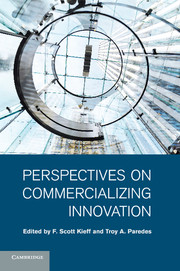Book contents
- Frontmatter
- Contents
- Contributors
- Dedication
- Acknowledgments
- Introduction
- Part I Perspectives on Theories of Intellectual Property
- Part II Perspectives on the Problems of Anticommons and Patent Thickets
- 6 Engineering a Deal
- 7 Understanding the RAND Commitment
- 8 Embryonic Inventions and Embryonic Patents
- 9 Innovation and Its Discontents
- Part III Perspectives on Finance and Commercialization
- Part IV Perspectives on the University Innovation
- Part V Perspectives on International Considerations
- Index
- References
7 - Understanding the RAND Commitment
from Part II - Perspectives on the Problems of Anticommons and Patent Thickets
Published online by Cambridge University Press: 05 December 2011
- Frontmatter
- Contents
- Contributors
- Dedication
- Acknowledgments
- Introduction
- Part I Perspectives on Theories of Intellectual Property
- Part II Perspectives on the Problems of Anticommons and Patent Thickets
- 6 Engineering a Deal
- 7 Understanding the RAND Commitment
- 8 Embryonic Inventions and Embryonic Patents
- 9 Innovation and Its Discontents
- Part III Perspectives on Finance and Commercialization
- Part IV Perspectives on the University Innovation
- Part V Perspectives on International Considerations
- Index
- References
Summary
Introduction
Prior to adopting a technical standard, standard-setting organizations typically endeavor either to make sure that the standard does not infringe any patent rights or to clear the necessary permissions. The task is a difficult one. The protocol that governs how information is stored on DVD-R media, for example, is known to implicate at least 342 different patents. The encoding, decoding, and transmission protocols relevant to just one type of cellular telephony touch well over 1,000. And radio-frequency identification (RFID) technology – those electronic tags that Wal-Mart and the Department of Defense hope will someday transform inventory management – is at this point rumored to labor under the weight of over 4,000 issued patents in the United States alone.
Those large numbers are problematic because it takes substantial time and money to evaluate a patent. To do the job right, consensus would have to be achieved as to whether the patent is valid, whether it covers a truly essential aspect of the standard at issue, and exactly how much the patent contributes as compared to next-best alternatives. Worse, all of that would need to be done in a context where patent holders have strong incentives to exaggerate; where information about pending patent applications is understandably hard to come by; and where there will often rage an independently contentious debate over nonpatent issues such as the specifics of what should and should not be included in the standard.
- Type
- Chapter
- Information
- Perspectives on Commercializing Innovation , pp. 211 - 233Publisher: Cambridge University PressPrint publication year: 2011
References
- 4
- Cited by



